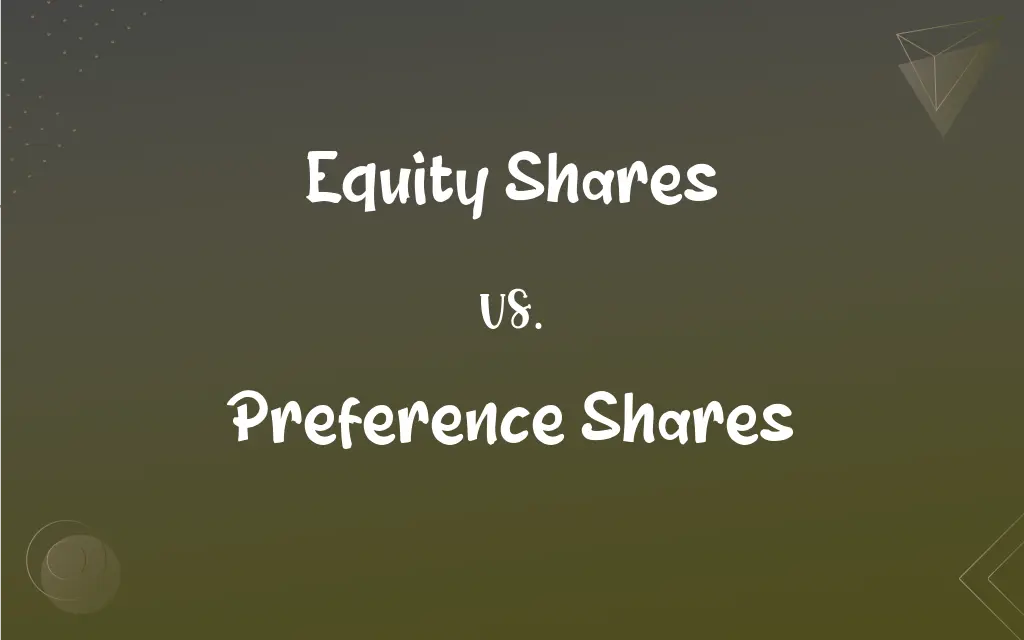Equity Shares vs. Preference Shares: What's the Difference?
Edited by Aimie Carlson || By Harlon Moss || Published on November 11, 2023
Equity shares represent ownership in a company with voting rights, while preference shares offer dividends priority without typically granting voting rights.

Key Differences
Equity shares represent a proportion of ownership in a company, entitling holders to voting rights. Preference shares, in contrast, prioritize dividend payments but usually don't provide voting rights.
When it comes to risk and rewards, equity shares can offer higher returns as they are linked to a company's performance, but they also carry higher risk. On the other hand, preference shares offer fixed dividends, which can be seen as less risky.
In case of liquidation, preference shares get priority over equity shares, ensuring that preference shareholders are paid before equity shareholders.
Equity shares are often seen as a long-term investment, given the potential for both capital appreciation and dividends. Conversely, preference shares are typically purchased for their steady dividend returns.
Both equity shares and preference shares play vital roles in capital structuring, with equity appealing to risk-tolerant investors and preference shares attracting those desiring stable returns.
ADVERTISEMENT
Comparison Chart
Ownership & Rights
Represent ownership with voting rights.
Offer dividends priority, usually without voting rights.
Dividends
Variable based on company performance.
Typically fixed or at a set rate.
Risk & Return
Higher risk and potential return.
Lower risk with steady returns.
Liquidation Priority
Paid after preference shareholders.
Paid before equity shareholders.
Nature of Investment
Seen as long-term with capital appreciation potential.
Desired for steady dividend income.
ADVERTISEMENT
Equity Shares and Preference Shares Definitions
Equity Shares
Shares that bear the highest risk in a company.
Investors with equity shares stand to gain or lose the most based on company performance.
Preference Shares
Shares that offer dividends priority over equity shares.
He purchased preference shares for the consistent dividend income they provided.
Equity Shares
The primary source of long-term finance for a company.
The firm issued more equity shares to raise capital for expansion.
Preference Shares
Shares with a fixed or set rate of dividend.
The preference shares promised a 6% dividend annually.
Equity Shares
Shares representing ownership in a company with voting rights.
He bought equity shares of the tech startup, hoping to have a say in its direction.
Preference Shares
Shares that get repayment priority during company liquidation.
In the event of bankruptcy, preference shares get paid out before equity shares.
Equity Shares
A stake in a company's assets and earnings.
With her equity shares, she benefitted from the company's growth.
Preference Shares
Shares that typically don't provide voting rights.
Despite holding preference shares, she couldn't vote at the annual meeting.
Equity Shares
Shares that have the potential for both dividends and capital appreciation.
She invested in equity shares for the dual benefit of dividends and stock price growth.
Preference Shares
A hybrid form of financing, combining features of both equity and debt.
The company issued preference shares to leverage the benefits of both debt and equity.
FAQs
What rights do equity shares provide?
Equity shares grant ownership and typically voting rights in a company.
Which shares have higher potential returns: equity or preference?
Equity shares generally offer higher potential returns, but with higher risk.
Are dividends guaranteed for preference shares?
Preference shares offer dividend priority, but they aren't always guaranteed.
Can equity shares appreciate in value?
Yes, equity shares can appreciate or depreciate based on company and market performance.
Can a company have both equity and preference shares?
Yes, many companies issue both types of shares based on their capital needs.
Do preference shares offer voting rights?
Typically, preference shares don't offer voting rights, but there are exceptions.
Are the dividends of preference shares fixed?
Preference shares often have fixed or set rate dividends, but not always.
Do all equity shares pay dividends?
Not necessarily. Dividend payments for equity shares depend on company profits and policies.
How do preference shares benefit companies?
Preference shares provide capital without diluting voting rights, offering a hybrid of debt and equity.
Which is more common: equity or preference shares?
Equity shares are generally more common, but many companies issue both types based on their financing needs.
In liquidation, who gets paid first: equity or preference shareholders?
Preference shareholders get payment priority over equity shareholders.
Do equity shareholders bear the highest risk?
Yes, equity shareholders bear the highest risk and potential reward in a company.
Are equity shares always publicly traded?
No, equity shares can be both publicly traded (in stock markets) or privately held.
Can preference shares be converted to equity shares?
Some preference shares come with conversion rights, allowing them to become equity shares.
What drives the price of equity shares?
Company performance, market sentiment, and broader economic factors influence equity share prices.
Are preference shares long-term investments?
Preference shares can be both short-term and long-term, often bought for steady dividend returns.
Which share type typically has a higher dividend: equity or preference?
Preference shares usually offer higher dividends than equity shares.
Can equity shareholders influence company decisions?
Yes, through voting rights, equity shareholders can influence major company decisions.
Is it mandatory for companies to issue preference shares?
No, issuing preference shares is a choice based on a company's capital structure strategy.
Why might investors choose preference shares over equity shares?
For more stable returns and dividend priority, especially if they don't seek voting rights.
About Author
Written by
Harlon MossHarlon is a seasoned quality moderator and accomplished content writer for Difference Wiki. An alumnus of the prestigious University of California, he earned his degree in Computer Science. Leveraging his academic background, Harlon brings a meticulous and informed perspective to his work, ensuring content accuracy and excellence.
Edited by
Aimie CarlsonAimie Carlson, holding a master's degree in English literature, is a fervent English language enthusiast. She lends her writing talents to Difference Wiki, a prominent website that specializes in comparisons, offering readers insightful analyses that both captivate and inform.







































































